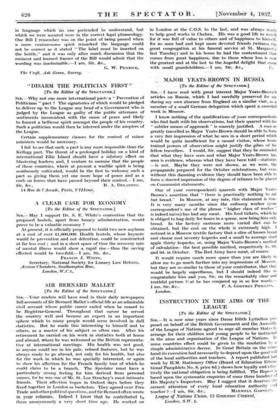MAJOR yEATS-BROWN IN RUSSIA • - • [To the-Editor of
the SPECTATORal
SIR,—I have read with great interest Major Yeats-Browns articles on' Russia, which I had carefully preserved for me during my own absence from England on a similar visit, as a • member of a' small German delegation which spent a crowded week in Moscow.
I know nothing of the qualifications of your correspondents who find fault with his observations, but their quarrel with his "subtler means of approach is scarcely justified. A man as greatly travelled as Major Yeats-Brown should be able to form a very fair impression of what he sees in a short period which would be quite insufficient for a casual visitor, whose lesser trained powers of observation might justify the gibes of his fellow travellers. I would, Sir, suggest that they be reminded that what they have seen and what Major Yeats-Brown has seen is evidence, whereas what they have been told—statistics —is not. Maybe they were not shown, as we were, the propaganda prepared for the October celebrations, but even without this damning evidence they should have been able to form a shrewd impression of the degree of reliance to be place! on Communist statements.
One of your correspondent; quarrels with Major Yeats. Brown's assertion that "there is practically nothing to eat but bread." In Moscow, at any rate, this statement is true. It is very many months since the ordinary worker (your correspondent's use of the phrase "higher class of worker" is indeed naive) has had any meat. His food tickets, which he is obliged to hug daily for hours in a queue, now bring him only bread. In the factory canteens more varied diet can be obtained, but the cost on the whole is extremely high. I noticed in a Moscow textile factory that a slice of brown bread and cheese cost seventy kopecks and a small to average sized apple thirty kopecks, or, using Major Yeats-Brown's method of calculation--the best possible method, respectively is. 9d. and 9d. in October. The Red Army have meat, of course.
It would require much more space than you are likely to allow me to go much further into my impressions of Moscow, but they are so similar to those of your contributor, that they would be largely superfluous, but I should indeed like to congratulate him and you, Sir, on the remarkably clear and truthful, picture tl at he has conjured up in so few words.—










































 Previous page
Previous page